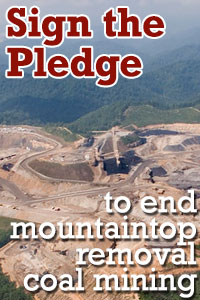News
How are you connected to mountaintop removal coal?
Sunday, November 18th, 2007
Here is the article about the “My Connection” campaign published in the Wall Street Journal on November 15th, 2007:
Activists Start Googling – Activists trying to save the planet are adding Google Earth to their arsenals.
Appalachian Voices, which campaigns against coal mining that removes mountaintops, is among those leading the way. The Boone, N.C., nonprofit and partner of community organizations today will begin directing consumers who enter their ZIP Codes on its site to images of specific mountaintops that have been razed to provide coal for their electricity providers, and potentially for their own homes.
The new service uses the mapping and aerial imagery provided by Google Inc.’s Earth and Maps offerings to show actual pictures of the mountaintops. The Google services are popular for providing free detailed aerial images of most places in the world, allowing computer users to easily zoom in for a peek. Google Maps can be accessed over the Web, and Google Earth requires special software be installed on a user’s computer.
Now those Google programs are making possible efforts to raise the awareness of Americans to the impact of their consumer choices, even if it is felt primarily in other states or across oceans. Google, Mountain View, Calif., says other groups are preparing projects that show consumers their impact on climate change. Some green businesses are developing similar applications as well.
The latest efforts are nascent, and it remains unclear whether they will reach people who aren’t already sold on the underlying causes. But the theory is that consumers will be less likely to buy lumber from clear-cutting operations or jewels from mines that pollute surrounding areas, for example, when confronted with images of the specific impact. Appalachian Voices is providing individuals with links to protest to their legislators or power companies about the mining, which it says is bad for the environment, miners and the local communities.
“When you can show people they have a direct connection to it, it makes it that much more relevant to their day-to-day life,” says Mary Anne Hitt, Appalachian Voices’ executive director.
Using the nonprofit’s new service a person in Washington, for example, might learn that there are four power plants feeding his electricity provider that use coal mined with mountaintop-removal methods. A satellite map shows their locations and the mines they draw from, which the individual can zoom in on. The Appalachian Voices site — ilovemountains.org/myconnection — provides related data, such as photos, videos and information about the mines and local communities. A user can download data about the mines he is connected to and zoom around them in the separate Google Earth software.
Rebecca Moore, manager of the Google Earth Outreach program, calls the Appalachian Voices service “very cutting edge” and says other groups are preparing similar ones. The Earth Outreach program, officially rolled out in June, provides technical advice and training to nonprofits interested in using Google Earth.
. . .
Ms. Hitt says her presentations to legislators, businesspeople and citizens about mountaintop-removal mining gained power last year when she started using Google Earth. Appalachian Voices made available maps and aerial images from Google Earth and Maps on the Web so individuals could navigate the affected areas.
For some, Appalachian Voices’ newest service shows ways in which virtual worlds such as Google Earth and individuals’ experience of the real world will increasingly overlap.” Being able to browse one’s patterns of consumption virtually and the spatial ramifications of them is a particularly thoughtful example of the sorts of things we’ll likely be doing in a variety of ways from the commercial to the philanthropic,” says Nicholas de Monchaux, an assistant professor of Architecture at the University of California, Berkeley.
Originally published in the Wall Street Journal on November 15th, 2007. Click here to read the entire article. (you’ll need to signup for subscription to Journal online.)










November 15th, 2007 at 2:51 pm
As a retired underground coal miner I know too well the dangers of the industry to not only the miners but also to our air,land and water.
Now, with MTR, the hidden costs of cheap electricity have risen exponentially.The refusal by the Bush White House and the appointees in the DOJ,EPA,MSHA,the Corps of Engineers,and the Courts,to enforce the laws under their respective jurisdictions have only pushed the costs into the future,in the form of environmental and species destruction,global warming,and less and less drinkable water,which we will soon realize is more valuable than coal or electricity! Ask the people of Atlanta or Las Vegas.